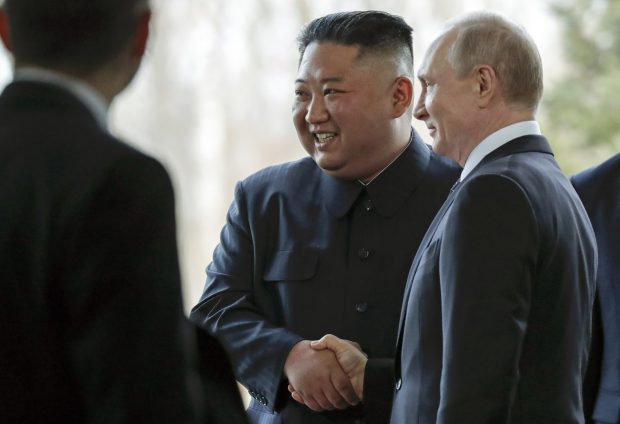
Kim, Putin begin first summit over denuclearization, economic cooperation
North Korean leader Kim Jong-un began his first summit with President Vladimir Putin in Russia’s Far East city of Vladivostok on Thursday, with a peaceful resolution of Pyongyang’s nuclear quandary expected to top the agenda. The much-anticipated summit is seen as a key test of Kim’s diplomatic outreach aimed at breaking a logjam in a denuclearization parley with the United States, easing sanctions pressure and catalyzing his lackluster drive for economic development.
Kim and Putin met at Far Eastern Federal University on Russky Island in the Pacific port city, where their national flags are hoisted, security heightened and the adjacent Ajax Bay closed to fend off any suspicious approaches. In his opening remarks, Kim said that the summit with Putin will be “meaningful” for joint efforts to address Korean Peninsula issues. “Now, world attention is focused on Korean Peninsula issues,” he said.
“I believe (the summit) will be very meaningful dialogue to assess peninsula policy together, share each other’s views and work together to jointly make adjustments and research going forward,” he added. Putin expressed his support for ongoing efforts for inter-Korean dialogue and for improved relations between the North and the U.S. “On the occasion of (your visit) to Russia this time, I expect that the bilateral relations will develop, and that (we) can find a good solution to addressing the situation on the Korean Peninsula,” he told Kim through an interpreter. “And I think that we will be able to continue this trend, this change that is positively unfolding nowadays,” he added.
Flanked by top party, military and state officials, Kim arrived by train in Vladivostok on Wednesday afternoon for his first foreign trip since the collapse of his second summit with U.S. President Donald Trump in Hanoi in February. Since the no-deal summit, Kim has been trying to close ranks with his major-power supporters — China and Russia — while calling for flexibility in Washington’s tough-line stance installed nuclear negotiations. According to the Kremlin, Kim and Putin will first hold a one-on-one meeting and then be joined by their delegation members. A formal reception will also be held. Citing an informed source, Russian news service RIA Novosti reported that the leaders will hold talks for around four hours — a one-on-one session for about an hour followed by an extended meeting for three hours.
The North’s delegation includes two vice chairmen of the North’s ruling Workers’ Party’s Central Committee — Kim Phyong-hae and O Su-yong — and Foreign Minister Ri Yong-ho and First Vice Foreign Minister Choe Son-hui. Also among them is Ri Yong-gil, chief of the general staff of the North’s Korean People’s Army. The Russian delegation was expected to include Deputy Prime Minister Yury Trutnev, Foreign Minister Sergey Lavrov, Transport Minister Yevgeny Dietrich and Minister for the Development of Russia’s Far East Alexander Kozlov. The Kremlin has said that atop the summit agenda will be how to resolve the North’s decades-old nuclear standoff.
Moscow and Pyongyang favor a phased, incremental approach to the North’s nuclear disarmament, while Washington calls for the North to take sweeping denuclearization steps before any rewards are given. Putin could reiterate Russia’s penchant for a multilateral framework to address the nuclear conundrum amid worries that Moscow could be left out of the loop with Washington and Beijing influencing Korea peace efforts, analysts said. Aside from security issues, the leaders could discuss ways to expand economic cooperation and Moscow’s humanitarian aid to Pyongyang, as well as the prospect of three-way economic projects involving the two Koreas and Russia. However, economic cooperation is bound to face restrictions stemming from U.N. Security Council (UNSC) sanctions.
The agenda may also include the fate of around 10,000 North Korean workers in Russia that face repatriation at the end of this year due to the UNSC sanctions banning the issuance of new visas for such workers, a key source of hard currency for the impoverished North. It remains unclear whether Kim and Putin will hold a joint press conference or issue any post-summit public statement. Ahead of the summit, U.S. Secretary of State Mike Pompeo said that the U.S. is determined not to repeat past mistakes by giving the North “a bunch of money in exchange for too little.” “We’re very focused on getting the right set of incentives for both sides so that we can achieve the objective,” he said during an interview with CBS News on Wednesday.
“It’s gonna be bumpy. It’s gonna be challenging. I hope that we get several more chances to have serious conversations about how we can move this process forward.” Asked if he saw a path to a deal leading to denuclearization, Pompeo said, “I do. I absolutely do.” Meanwhile, South Korean President Moon Jae-in will meet with Nikolai Patrushev, secretary of the Security Council of the Russian Federation in Seoul on Thursday afternoon, according to the presidential office Cheong Wa Dae. They are expected to exchange views on the Kim-Putin summit in Vladivostok. Patrushev is visiting here for a security consultation with Chung Eui-yong, director of Cheong Wa Dae’s National Security Office.
This Vladivostok summit is the first one between the leaders of the two countries in eight years, after Kim’s late father and former leader, Kim Jong-il, met then Russian President Dmitry Medvedev in 2011. Following the summit, Kim Jong-un is expected to take a tour of the city and return home Friday or Saturday.



